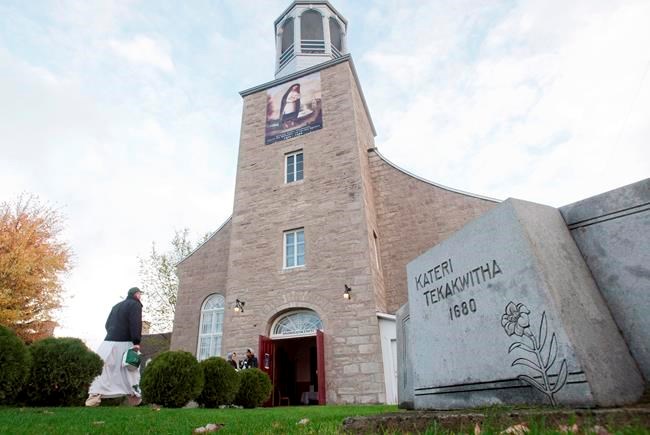MONTREAL — The Mohawk community of Kahnawake voted this weekend to move the remains of a priest facing sexual abuse allegations.
Several Kahnawake residents came forward last summer with allegations that Rev. Léon Lajoie had abused them, and demanded that his remains be removed from the community south of Montreal.
"I feel relieved, I was in shock they had to tell me three times that they voted in favour of his removal," said Melissa Montour-Lazare, the spokesperson for the group demanding the exhumation. "I'm happy for the survivors and wish them well on their healing journey. They can rest their minds now."
The Mohawk Council of Kahnawake shared the results on Saturday, saying 420 people voted. While two votes were invalid, 223 people voted in favour of Lajoie's exhumation, against 195 people who wanted to keep his remains in the community.
Lajoie, a Jesuit assigned to Kahnawake from 1961 to 1990, was buried in the community in 1999 and will be moved to Saint-Jerome, Que., at the Jesuits' gravesite.
The council previously said it sought the community's input regarding the exhumation because the former elected chiefs agreed to Lajoie's burial without seeking community members' consent. A non-Indigenous person doesn't have the right to burial on Mohawk territory, but the council said an exception was made because of Lajoie's connection to the community.
Montour-Lazare, however, said in a recent interview that holding a vote on this matter divided the community at the expense of sexual abuse survivors.
"It puts the traditional people, who don’t participate in voting, in a bad situation," she said, explaining that voting goes against traditional laws and beliefs.
"They are backed into a corner."
The decision comes after the Jesuits' independent investigation into the allegations failed to turn up evidence of abuse, according to a report released Feb. 28.
"Our detailed report does not currently support any allegation of childhood sexual abuse by Father Leon Lajoie, S.J. in Kahnawà:ke during the period between 1956-1990," the report read.
The council declined to comment on the report and on the result of the vote.
"The Lajoie issue is being treated as an internal matter to the community," Justus Polson-Lahache, a spokesperson for the council, said in a statement. "As a result, we are not fulfilling any external media requests on this issue."
Private investigation firm King International Advisory Group — commissioned by the Jesuits — reviewed archive documents and conducted 20 interviews between November 2021 and February with community members "who had pertinent information."
The report identified three alleged complainants, but only two agreed to testify.
Brian King, who founded the investigation firm and was the lead on the report, said he was expecting more testimonies after reading media coverage claiming that up to 20 alleged victims had come forward.
"They were speaking to the media, so why would they speak to the media and not us," King questioned in a recent interview. "When I have been involved in cases where there are as many as allegedly 20 victims, there’s gonna be some that are gonna come forward."
King said the investigation didn't substantiate that there were other victims, though his report acknowledged that there are several reasons why survivors would opt not to report allegations of sexual abuse.
"Some of these include the fear of being ostracized by family members, members of the community, a feeling of shame, a fear of disrupting the lives of loved ones, the fear of being branded a liar," the report read.
Montour-Lazare said the report did exactly that by offering what she believes to be a misleading conclusion.
"It’s diminishing, it’s deceiving and very hurtful," she said. "This is the prime example of why people don’t come forward. It took them enough to say they are one of them … you can’t rush something like that. You can’t force somebody to make a statement."
Montour-Lazare declined to provide an account of how many alleged survivors were in the group, but said not every one of them identified Lajoie as their perpetrator.
"They said it was different ones that were passing through the parish or were there helping at the time," Montour-Lazare said.
In fact, while the investigation didn't support any findings against Lajoie, it concluded that one of the complainants was the victim of "a serious sexual assault on one occasion at St. Francis-Xavier Mission" between 1976 and 1979.
King said there will likely be a continued investigation into the matter, as witnesses provided information on three individuals associated with the church that had been suspected of child-related abuse in that period.
The Jesuits acknowledged the report last week, and said in a statement they were acting on the recommendations to support, listen and respond to victims of abuse.
They also maintained their desire to follow the council's lead on this issue, and pay for all related costs of the exhumation and reburial outside the community.
This report by The Canadian Press was first published on March 27, 2022.
Virginie Ann, The Canadian Press




